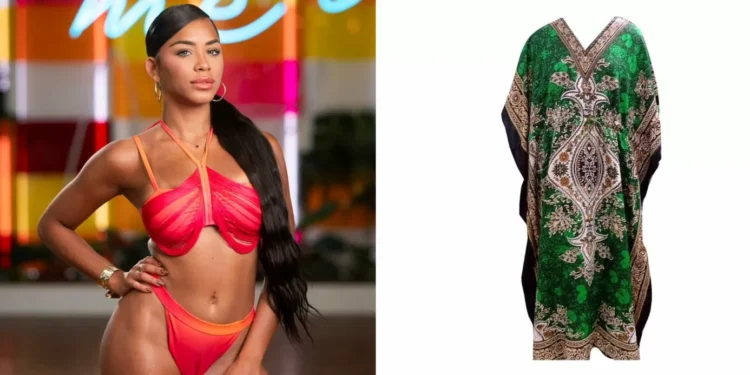Love Island USA has taken the world by storm, and it’s no surprise that the show is having a major impact on our current culture. While there have been many love-centered reality shows in the past, Love Island’s popularity is unmatched. The show’s unique concept of being secluded on an island to find love has captivated audiences, and the contestants themselves have played a significant role in the show’s massive impact.
One standout moment from the show that is still on everyone’s minds is Amaya Espinal’s (aka our sensitive gangster) iconic muumuu. In episode 28, Amaya wore a muumuu, and it caused a stir among viewers. But her muumuu is far from just another piece of clothing that has gone viral on TikTok. In fact, it holds a special significance for Amaya and represents much more than just a fashion statement.
In an interview with the Today show, Amaya revealed that she only had a day to prepare for the show before being flown to Fiji. She quickly packed a suitcase with all her essentials, including the muumuu she had picked up during a trip to Portugal. “Bringing that piece back to the villa reminded me of my travels and reminded me of the good days whenever I was having a bad one,” she said. “It was more than a dress for sure – it really made me feel grounded.”
But Amaya’s muumuu is not just a sentimental piece for her; it also holds cultural significance that is worth noting. The muumuu can be traced back to the early 19th century when Christian missionaries in Hawaii influenced native women to wear the dress to promote modesty. Over time, Hawaiian women adapted the dress to make it more casual and comfortable, and it became known as the “holokū.” Eventually, it was renamed the muumuu and became a popular choice for everyday wear, vacations, and Hawaiian-themed parties. Even today, celebrities like Kris Jenner, Oprah Winfrey, and Gayle King have been spotted wearing muumuus on their vacations.
Amaya’s decision to wear a muumuu on the show is a refreshing change from the typical revealing outfits we see on reality shows. It is a testament to the diversity that we need to see more of on television and a reminder that modesty can still be attractive. During the scene in which she wore the muumuu, her partner, Bryan Arenales, even complimented her look, proving that you don’t always need to show skin to be deemed attractive or desired – especially in the eyes of your romantic partner.
While Amaya’s exact dress may not be available to shop, there are plenty of similar options that evoke the same level of style and confidence. Some great alternatives include the Unique Kaftans Floral Print Long Tunic Dress, JaipurCraftandArt Cotton Kaftan, and H&M Oversized Kaftan Dress. These dresses are not only fashionable but also promote the idea that modesty is still attractive and can be embraced by all.
Amaya’s muumuu moment on Love Island USA has not only made a fashion statement but also sparked important conversations about diversity and modesty. It’s refreshing to see a contestant on a reality show confidently embrace her personal style and cultural heritage. Amaya’s bold fashion choice has inspired many, and we can only hope to see more representation and inclusivity on our screens in the future.
Naomi Parris, an assistant shopping editor at Popsugar, based in New York, believes that Amaya’s muumuu moment on Love Island USA is a powerful reminder of the importance of embracing one’s culture and personal style. With over eight years of experience in the fashion and beauty industry, Naomi is no stranger to telling stories that merge fashion, beauty, and Black culture. She has also lent her writing skills to publications like Essence Girls United, Elle, Bustle, and Elite Daily. When she’s not crafting shopping roundups or trend guides, you can find Naomi behind her blog “Eli-Nay,” where she shares her love for fashion, culture, and all things beautiful with her followers on Instagram.
In conclusion, Amaya’s muumuu moment on Love Island USA has not only made a fashion statement but also sparked important conversations about diversity and modesty. It’s a reminder that fashion is not just about looking good, but also about feeling confident and comfortable in your own skin. And with more representation and inclusivity






